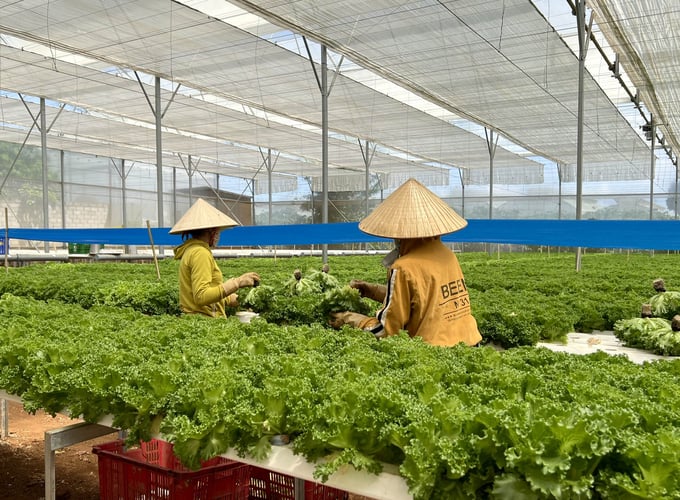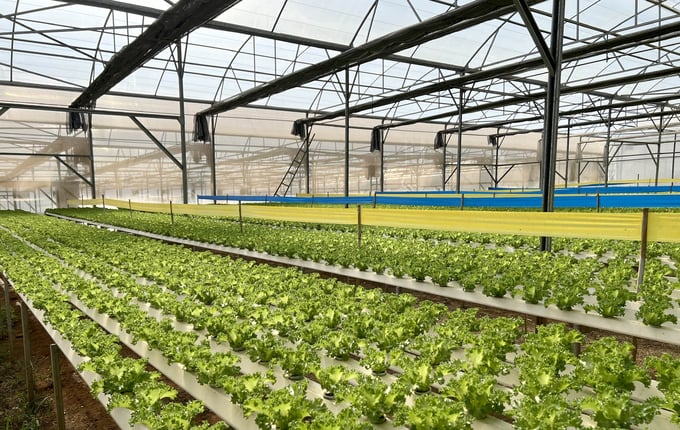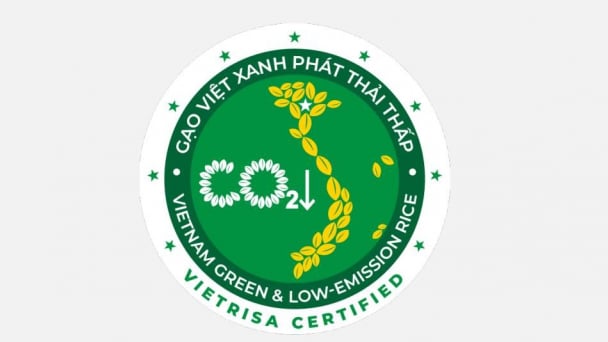May 16, 2025 | 10:08 GMT +7
May 16, 2025 | 10:08 GMT +7
Hotline: 0913.378.918
May 16, 2025 | 10:08 GMT +7
Hotline: 0913.378.918

Workers harvesting vegetables in the circulating hydroponic vegetable greenhouse of Phong Thuy Company. Photo: Son Trang.
Phong Thuy Agricultural Production and Trading Co., Ltd. is a large-scale vegetable production enterprise in Duc Trong district, Lam Dong province. Currently, the company cultivates more than 100 hectares of vegetables, with 30 hectares dedicated to high-tech greenhouse production. The enterprise provides the market with over 12,000 tons of high-quality vegetables and roots annually.
Within the 30 hectares of high-tech vegetable production at Phong Thuy Company, 10 hectares are designated for circular hydroponics. This procedure was transferred by the Center for Agricultural Technology Transfer and Research, Southern Agricultural Science Institute, according to Mr. Nguyen Quoc Thang, Deputy Director of Phong Thuy Company.
Due to the implementation of circular hydroponic vegetable, Phong Thuy has achieved substantial savings in irrigation water. In particular, the daily water consumption for 1,000 m² of soil-based vegetable cultivation is 5-6 m³. Nevertheless, circular hydroponic vegetable necessitates an additional 2-3 m³ per day to account for water loss resulting from plant absorption and evaporation, even though the area remains the same.
Phong Thuy Company has implemented an additional solution by constructing large-capacity water storage tanks on the farm to capture rainwater from the greenhouse roofs and conserve irrigation water through the circulating hydroponic vegetable production model. The storage containers are the destination for the rainwater that falls on the greenhouse roofs and are subsequently utilized to produce hydroponic vegetables.
According to Mr. Thang, the pH level of precipitation is neither excessively high nor excessively low. Clean water is necessary for the cultivation of hydroponic vegetables. Minor sanitation is required for rainwater to be utilized in the hydroponic farm. Consequently, precipitation can be regarded as a natural resource for cultivating hydroponic vegetables.

A greenhouse for circulating hydroponic vegetable. Photo: Son Trang.
In addition, the construction of rainwater storage ponds helps prevent flooding in the surrounding area by preventing rainwater from overflowing at Phong Thuy's greenhouse vegetable plantations.
Circular hydroponic vegetable is being implemented by numerous farms in Duc Trong, in addition to Phong Thuy, resulting in a substantial saving of water. Mr. Le Cong Thon, a farmer in group 34, Lien Nghia town, Duc Trong district, disclosed that he has cultivated vegetables for decades. He discovered that circular hydroponic vegetable conserves one-third of the water consumed compared to soil-based vegetable cultivation during his experience with the method.
Master Ngo Xuan Chinh, Director of the Center for Agricultural Technology Transfer and Research at the Southern Agricultural Science Institute, reported that Lam Dong has more than 300 hectares of circular hydroponic vegetable. The application process by farmers has demonstrated that this is a water-saving production model, enabling farms to conserve approximately 40% of the water used in vegetable production compared to soil-based methods. Additionally, many farms implement solutions to capture and utilize all of the rainwater that falls on greenhouse roofs for vegetable production.
Circulating hydroponic vegetable production not only conserves water but also assists producers in achieving high economic efficiency by reducing post-harvest losses to below 10% and shortening the production cycle from 20 days to one month, in contrast to 30% in conventional production. Hydroponic vegetables grown in greenhouses virtually eliminate chemical pesticides, resulting in a higher selling price than conventional vegetables. This is due to the effective prevention of pests and diseases. In mid-July, soil-grown lettuce was priced at 15,000 VND/kg, while hydroponic lettuce from Phong Thuy Company was sold at 35,000 VND/kg.
Translated by Linh Linh

(VAN) Veterinary training should focus on quality, not just quantity. Veterinarians also need more options to pursue specialized training.

(VAN) The veterinary industry needs to be viewed objectively and further invested in to properly demonstrate its role and importance in the new context.

(VAN) The number of veterinarians graduating each year is not enough to meet actual needs, hence a difficult problem for the growing livestock industry.

(VAN) The strategic partnership between Cambodia, the Philippines, Vietnam, and CGIAR ensures that innovative solutions effectively address national priorities for food system development.

(VAN) This was affirmed by the UK Minister of State at the Department for Environment, Food and Rural Affairs during a working session with Deputy Minister Tran Thanh Nam on May 13.

(VAN) On May 13, the Ministry of Agriculture and Environment, in coordination with the Embassy of Vietnam in the United Kingdom, organized a seminar titled 'Connecting trade in Vietnam-UK agricultural, forestry, and fishery products'.

(VAN) The launch of the Vietnam green and low-emission rice brand is a positive signal for both businesses and farmers, marking readiness to reach new heights in the global market.